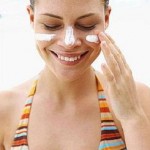 When you buy a sunscreen, surely the first thing you notice is that the protection factor to choose the one that suits your skin type, ie, your skin type.
When you buy a sunscreen, surely the first thing you notice is that the protection factor to choose the one that suits your skin type, ie, your skin type.
A good sunscreen should be resistant to sweat and water and should not cause irritation, these are some of the features that may have photoprotective:
At the pharmacy we can find sunscreen in different formulations: cream (more appropriate for the face and neck), milk (for use in the body), spray (suitable for athletes) and oil free emulsions for people with skin fat or acne problems.
Should we choose a light texture.
The absence of fragrance and parabens (preservatives) helps them to be suitable for all skin types, even the most sensitive.
It is desirable to protect against UVA and UVB rays. The first are long-range ultraviolet rays. Penetrate the deeper layers of the skin and are the main cause of premature skin aging. They are present throughout the day and every day of the year. They pass through glass, clouds, water … On the other hand, UVB rays have shorter wavelength than UVA, but high energy. Its effects are felt quickly on the skin and are responsible for burns. Both types of radiation contribute to the onset of skin cancer and are just as harmful, although the UVA spend more unnoticed. So far, it had paid more attention to UVB being of an intensity of 30-50 times the UVA and be the cause, direct and visible burns. But UVA radiation, although less intense, is in greater quantity and so present throughout the day. The UVB alerts us more easily: we feel more warmth, and know that noon is much more aggressive.
Is there any point to add antioxidants protective? Yes No filters because they contain, but because it has been shown that two of the most popular antioxidants (vitamin E and C) not only fight the free radicals caused by sun, but also reduce the number of epidermal cells showing an alteration of its nucleus.
A protective water resistant maintaining its original level of protection after 40 minutes of immersion in water (English term: water resistant). Meanwhile, a waterproof protector retains its original level of protection after 80 minutes of immersion in water (English term: waterproof). However, when we left the water, we need to reapply the protector forever. Keep in mind that the mere act of rubbing with a towel helps to remove the product from the skin and, therefore, we cut some of its effectiveness.



